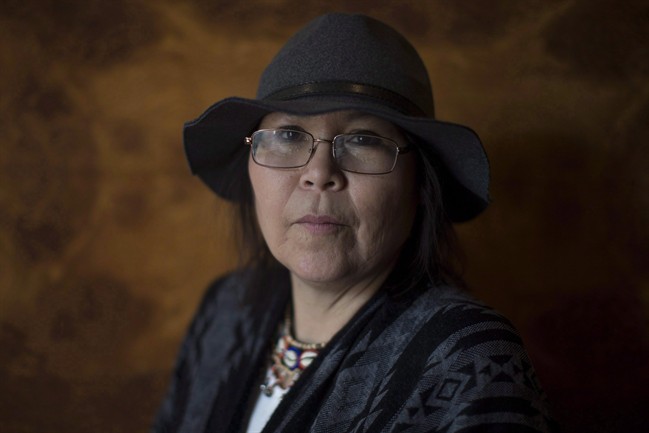TORONTO – Survivors of the ’60s Scoop accuse the Liberal government of opting for further hard-ball litigation, despite losing a bitterly fought legal battle, as a way to avoid paying compensation to thousands who were taken from reserves in Ontario as children and placed with non-native families.

Even though Indigenous Affairs Minister Carolyn Bennett has admitted Canada wronged the aboriginal children and said she wanted a settlement, Justice Department lawyers appear to be on a different path.
FROM THE ARCHIVES: National Chief reacts to Sixties Scoop ruling

Documents obtained by The Canadian Press indicate federal lawyers are fighting an attempt to move into a damages phase after Superior Court Justice Edward Belobaba ruled in February that Canada had breached its “duty of care” to the children.
The decision had prompted Bennett to say the government would “absolutely” not appeal and would try to resolve the issue.
READ MORE: Sixties Scoop ruling could cost federal government over $1 billion
However, a day after a May 11 meeting to start hammering out settlement details, according to those present, a government lawyer argued Belobaba had not found the government liable for the harm suffered by thousands of on-reserve children who lost contact with their roots after placement in non-aboriginal homes.
Belobaba asked for a written explanation on the issue, which was provided late last week.
“The court and the parties always contemplated that class identification, causation, damages and quantum of damages would have to be determined individually,” the government lawyers said in a memo to the judge.
“The summary-judgment decision does not establish liability — the claim is pleaded in negligence — and while duty of care and breach have been established on behalf of the class, causation in fact and damages still need to be proven individually.”
In addition, the government insists there’s “no evidence” of how many people are involved and deciding on a total amount of damages is impossible.
READ MORE: Alberta Premier Rachel Notley says talks continue on ’60s Scoop apology
Ahead of a hearing with Belobaba scheduled for Wednesday, a lawyer for the plaintiffs in the case called the government’s position “mean and cruel.”
“With the Conservative government, we got an abject ‘forget it, get lost’,” Jeffery Wilson said. “With the Liberal government, we got talk of reconciliation (but) instead we get this.”
Wilson, who represents lead plaintiff Chief Marcia Brown Martel, accused Ottawa of rendering Belobaba’s ruling meaningless by essentially pushing for thousands of individual trials. Canada, he said, was undoing the spirit of reconciliation by indicating it would litigate to the very end.
WATCH: Trudeau asks Pope for apology for residential schools

A senior Bennett spokesman, however, denied the government was trying to back-pedal on its admission of culpability or obligation to compensate the Scoop victims. Nor is there an attempt at a back-door appeal of Belobaba’s ruling, he said.
“The government admits that there is a liability but determining what that amount is means you need to look at what the individual experience was,” James Fitz-Morris said from Ottawa.
“We’re saying that we need to hear from individuals as to what was the range of harm that was done to them, and not re-arguing that there was harm. We’re not re-arguing that.”
At the same time, Fitz-Morris said, the government was committed to pursuing an out-of-court settlement with all ’60s Scoop victims across Canada. About 18 other class actions have been filed.
“We really are looking at this like two streams and they’re not mutually exclusive,” Fitz-Morris said. “Just because they’re continuing with the quantum hearing doesn’t mean that we’re going to back away from negotiations.”
READ MORE: What was the ’60s Scoop’? Aboriginal children taken from homes a dark chapter
The class action Belobaba ruled on, launched eight years ago, sought $1.3 billion on behalf of about 16,000 indigenous children in Ontario — roughly $85,000 for each child harmed by being placed in non-aboriginal homes from 1965 to 1984 under terms of a federal-provincial agreement.
Brown Martel, who has proposed claimants chip in settlement money for a new national healing foundation, a scholarship or chair at a university, said she would welcome a national settlement.
Yet her disappointment at how the government was now behaving toward her group of victims was palpable.
“It’s actually very disheartening. It’s very sad,” Brown Martel said in an interview.
“What they’re saying now is just negating everything that Justice Belobaba had to say. What I hear Carolyn Bennett say and what I see the government of Canada do is contrary.”
- Life in the forest: How Stanley Park’s longest resident survived a changing landscape
- Bird flu risk to humans an ‘enormous concern,’ WHO says. Here’s what to know
- Mental health support still lacking 4 years after mass shooting: Nova Scotia mayor
- Buzz kill? Gen Z less interested in coffee than older Canadians, survey shows



Comments